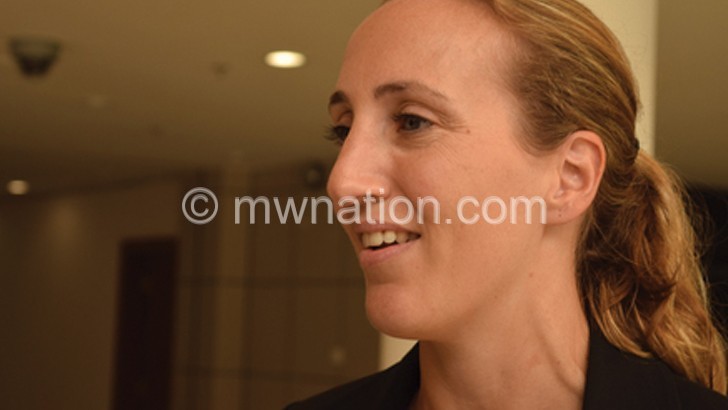‘UK will bring new investments into the country’
Last month, British Prime Minister Theresa May visited Southern Africa for the first time since becoming prime minister in 2016. She visited South Africa, Nigeria and Kenya as part of a trade mission aimed at boosting post-Brexit fortunes. The prime minister said the trip would “deepen and strengthen UK’s global partnerships”. In this interview, our reporter SUZGO CHITETE sat down with the British High Commissioner Holly Tett to find out if the trip has any significance to Malawi and other matters.

The Prime Minister recently visited the Southern Africa—how does such a trip help countries like Malawi?
This trip was all about signalling a step change in the relationship between the United Kingdom [UK] and Africa. The clear message was that the UK wants to use the opportunity of Brexit to renew our partnership with Africa, particularly by bringing the transformative power of private sector trade and investment from the UK to Africa. Thirty chief executive officers [CEOs] accompanied the Prime Minister [PM] and they signed deals in all the countries they visited. The PM also announced significant new investments across the continent including to tackle global security issues like serious organised crime and modern slavery. This trip has generated significant momentum that we want to build on here in Southern Africa and specifically in Malawi to ensure that our partnership is ensuring prosperity and security for the people of both nations.
The PM while in South Africa, among other pledges, said she wants by 2022, the UK to be the G7’s number one investor in Africa, with Britain’s private sector companies taking the lead in investing the billions of British pounds that will see African economies growing by trillions” how can Malawi take advantage of this bold ambition?
We are excited about this, and it is very relevant to Malawi. The PM announced that the UK will mobilise an additional £4 billion of private investment into Africa over the next four years. We are already looking to bring new investment into the country, and will step up these efforts. The UK’s private investment arm—CDC—is investing over £50 million into businesses in the country. And through UKaid, we are investing £10 million into agricultural businesses that will boost the rural economy. This will have a direct and significant impact on the incomes of farmers and farm workers.
The UK remains an important traditional donor to Malawi. What’s your view of government’s commitment to fighting corruption and promoting good governance?
Research funded by the UK in Malawi shows that prosecution of serious corruption and recovery of assets can help deter corruption—at least of the kind that we saw under Cashgate. The UK is continuing to support institutions that are dedicated to reducing impunity, but we are concerned by the number of corruption cases that are still coming to light related to government procurement. Each case represents poorer services and less investment for all Malawians. So, tightening up procurement processes should be a big priority. Simple steps like publishing contract awards, and creating a public database of company ownership could help prevent some of this corruption and collusion.
While a collective effort across government is needed, we think that greater Anti-Corruption Bureau [ACB] independence would enable it to fulfil its mandate, and protect it from perceptions of interference. We hope that filling the deputy DG vacancy will be done through an open and competitive process.
Elections are approaching and political party financing is another fertile ground for corruption, how do you think the country should handle the issue when the Political Party Act cannot be put into effect?
The Political Party Act was passed by Parliament in November 2017 and we understand the minister [of Justice and Constitutional Affairs] is still to assign it to date. There was cross party support for the Act in Parliament and we hope it will be put into effect imminently. The UK has offered support to implement this Act once that happens. We would like to help Malawi rise up the ranks. A 2014 report on Money, Politics and Transparency ranked Malawi bottom out of 54 countries on campaign finance indicators.
More broadly, Malawi has passed a number of other important pieces of legislation in the last couple of years that we understand are also still awaiting the relevant minister to put them into effect. These include the Access to Information Act and the Amendment to the Public Audit Act. Malawi has a good reputation for having a strong legal framework – but there is still a big implementation gap. Implementation of these laws will also help prevent corruption.
The country has already witnessed cases of political violence ahead of the elections – what do you say on this?
We are concerned about these sporadic cases of violence. The violence against women is particularly worrying and discourages women’s participation in politics. Malawi has a global reputation of being a peaceful, democratic country. Strong commitment by all parties to a peaceful process will be helpful to ensure all Malawians can exercise their rights to participate in politics and to vote for their preferred candidates.
Lastly, human rights activists claim that they continue leaving in fear as they suffer from threats apparently for being critical of the government. Recently, the CHRR offices in area 47 were attacked, does this worry you as development partners?
Yes, we are concerned about an increasing number of threats and intimidation against human rights defenders and activists in Malawi. There have been a number of incidents reported over the past few weeks, including against women. We would urge the authorities to ensure that attacks and threats against human rights defenders are thoroughly investigated and that the crucial work carried out by civil society actors is protected.





